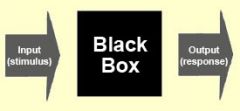![]()
![]()
![]()
Use LEFT and RIGHT arrow keys to navigate between flashcards;
Use UP and DOWN arrow keys to flip the card;
H to show hint;
A reads text to speech;
39 Cards in this Set
- Front
- Back
|
Empirical |
experience rather than reasoning or speculation |
|
|
empirical evidence |
comes from observations or experiments |
|
|
most psychological questions are _______ to answer |
hard |
|
|
What are the 3 oldest Philosophical issues? |
-Free-Will vs. Determinism -Mind-Brain Problem -Nature vs. Nurture |
|
|
Free will vs. Determinism |
Can we control our own behavior or is it already predetermined |
|
|
Mind- Brain problem |
What is the relationship between the mind and the brain |
|
|
Nature vs. Nurture |
Are the differences we see in people because of biology of experience. |
|
|
Definition of psychology |
The systematic study of behavior and experience |
|
|
How is it different from other sciences |
It is trying to understand human experience and behavior |
|
|
3 unique qualities of psychology |
-common sense vs. science -complexity of the subject -diversity of approaches and view points |
|
|
Common sense vs. science |
everyone has psychological thoughts not everyone has biological or chemistry thoughts |
|
|
Complexity of the subject |
Humans are the most complex organisms |
|
|
Diversity of approaches and viewpoints |
different points of view, there are no set ways of doing things. |
|
|
Determinism |
everything happens has a cause that that can be observed |
|
|
Free will |
behavior is caused by a persons own decisions |
|
|
dualism |
the mind is separate from the brain but some how controls the brain and entire body |
|
|
Monism |
conscious experience is inseparable from the actual brain |
|
|
Clinical psychologist |
Advanced degree in psychology -Understands and helps people with psychological problems (depression, anxiety exc.) |
|
|
Psychiatry (Psychiatrist) |
Branch of medicine that deals with emotional disturbances (Psychiatrist can prescribe drugs) |
|
|
Psychoanalysts |
Therapy providers who rely heavily on the theories and methods pioneered by the early 20th century (try to infer meaning behind peoples words and actions) |
|
|
Structralism |
attempt to describe the structures that compose the mind -First historical movement |
|
|
Wilhelm Wundt (S) |
established the first psychology lab -Structralism |
|
|
Edward Titchener (S) |
-student of Wundt -established first psychology lab in U.S. (Cornell Univ.) -Structralism |
|
|
Reductionism (S) |
reducing complex systems into elementary components -Didn't work in psychology |
|
|
Introspection (S) |
Turing attention inward, focusing of internal experiences -describe every aspect of an experience(size, color, pressure, taste, shape, exc.) |
|
|
Why didn't introspection work? (S) |
-unnatural -no way to verify what people report -made things more complicated -many people didn't agree on results |
|
|
Functionalism |
to learn how people produce useful behaviors |
|
|
William James* (F) |
Known as the founder of American psychology *Professors favorite psychologist -His work is still relevant today -Published the 1st psychology book |
|
|
Behaviorism |
Concentrates on observable, measurable behaviors and not on the mental processes -Many of their research was done on animals not humans |
|
|
General Laws of learning (B) |
believed they could find general laws that applied to all organisms |
|
|
John B. Watson (B) |
-founder of behaviorism -nurture not nature --We are shaped by our history and experiences |
|
|
Clark Hull (B) |
tried to find mathematical equations for answers to question like hunger of rats in a maze |
|
|
B.F. Skinner (B) |
-Thought to apply behaviorism to problems in society -Most influential behaviorist |
|
|
Why is behaviorism not used much today? |
-impossible to explain simple things like hunger or a rat in maze -couldn't study human abilities (speech exc.) - Not enough to find out what happens inside a person psychologically |
|
|
Theoretical vs. Methodological Behaviorism |
-theo: Human behavior can be explained by basic laws of learning -metho: using what we lean to find the causes behind behaviors |
|
|
**Human behavior is the function of the environment** |
Important fact |
|
|
Cognitive Revolution* |
-used today -Increasing focus was placed on observable behaviors in relation with brain activity and structure. -diverse ideas, very open |
|
|
Black box |

|
|
|
"It depends" |
All aspects of behavior depend of something |

